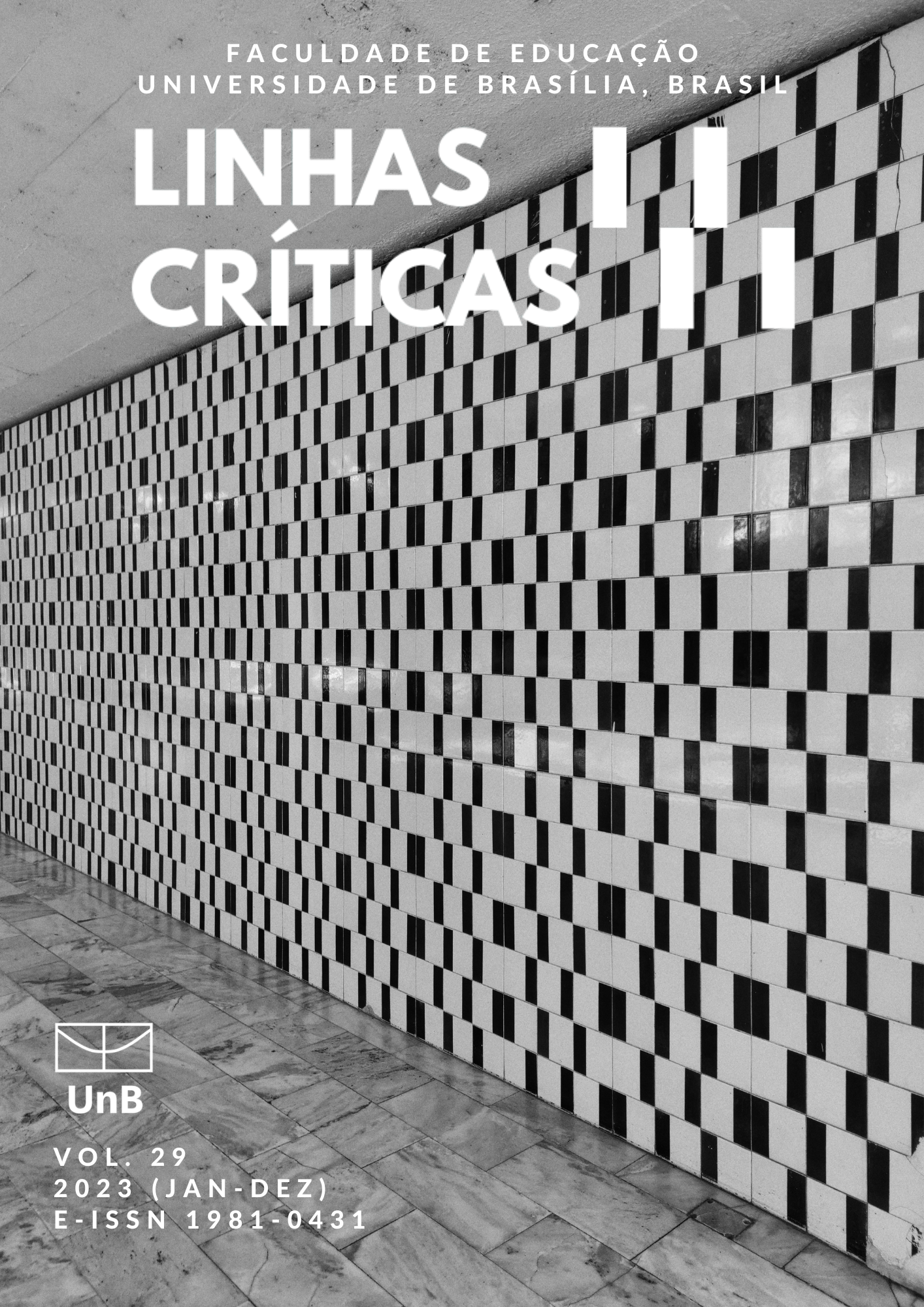“You’re filming us, right?”: listening and children’s participation in research
DOI:
https://doi.org/10.26512/lc29202350547Keywords:
Ethics in research, Research with children, Participation, Early Childhood EducationAbstract
The article brings methodological reflections regarding the process of listening and involving children throughout the research process. The analyzes are based on data collected in an early childhood education institution, through written, photographic and filmic records of a group composed of 25 children aged 5 and 6 years. As a theoretical basis for analysis, the knowledge and productions of Social Studies of Childhood. The research findings indicate the participation of children in choosing their names and authorizing records and use of footage as contributions to the need to reverse the process of “invisibilization” of children in scientific research and their modes of participation.
Downloads
References
Agostinho, K. (2010). Formas de participação das crianças na Educação Infantil. [Tese de doutorado, Universidade do Minho]. Repositorium Uminho. https://hdl.handle.net/1822/11195
Alderson, P. (2005). As crianças como pesquisadoras: os efeitos dos direitos de participação sobre a metodologia de pesquisa. Educação & Sociedade, 26(91), 419-442. https://doi.org/10.1590/S0101-73302005000200007
Bordenave, J. E. D. (1983). O que é participação. Editora Brasiliense.
Brasil. (2016). Resolução n. 510, de 7 de abril de 2016. Conselho Nacional de Saúde. https://conselho.saude.gov.br/resolucoes/2016/Reso510.pdf
Buss-Simão, M. (2012). Relações sociais em um contexto de educação infantil: um olhar sobre a dimensão corporal na perspectiva de crianças pequenas. [Tese de doutorado, Universidade Federal de Santa Catarina]. Repositório Institucional UFSC. https://repositorio.ufsc.br/handle/123456789/96146
Buss-Simão, M. (2022). Assentimento no decurso da observação participante nas pesquisas com crianças: acionando o radar ético. Em R. S. de Carvalho (Org.). Percursos investigativos em pesquisas com (sobre/para) crianças na educação infantil (1ed. pp. 57-83). Editora CirKula. https://livrariacirkula.com.br/downDigital/9786589312673/
Buss-Simão, M., & Lessa, J. S. (2023). Pesquisas etnográficas com crianças e adultas/os na educação infantil: desafios éticos, conceituais e metodológicos. Revista Diálogo Educacional, 23(76), 341-364. https://doi.org/10.7213/1981-416X.23.076.DS14
Christensen, P. (2004). Children’s participation in ethnographic research: issues of power and representation. Children and Society, 18, 165-76. https://doi.org/10.1002/chi.823
Coutinho, Â. S. (2019). Consentimento e assentimento. Em Associação Nacional de Pós-Graduação e Pesquisa em Educação. Ética e pesquisa em Educação: subsídios (pp. 62-65). ANPEd. https://www.anped.org.br/sites/default/files/images/etica_e_pesquisa_em_educacao_-_isbn_final.pdf
Ferreira, M. (2010). “- ela é nossa prisioneira!” – questões teóricas, epistemológicas e ético-metodológicas a propósito dos processos de obtenção da permissão das crianças pequenas numa pesquisa etnográfica. Reflexão e Ação, 18(2), 151-182. https://doi.org/10.17058/rea.v18i2.1524
Ferreira, M., & Nunes, Â. (2014). Estudos da infância, antropologia e etnografia: potencialidades, limites e desafios. Linhas Críticas, 20(41), 103–123. https://doi.org/10.26512/lc.v20i41.4260
Kramer, S. (2002). Autoria e autorização: questões éticas na pesquisa com crianças. Cadernos de Pesquisa, 116, 41-59. https://doi.org/10.1590/S0100-15742002000200003
Marcello, F. A. (2022). Ou sobre um éthos investigativo na pesquisa com (sobre/para) crianças. Em R. S. de Carvalho. (Org.). Percursos investigativos em pesquisas com (sobre/para) crianças na educação infantil (1ed. pp. 11-24). Editora CirKula. https://livrariacirkula.com.br/produto/9786589312673
Pereira, R. R, Gomes, L. O., & Silva, C. F. S. (2018). A infância no fio da navalha: construção teórica como agir ético. ETD- Educação Temática Digital. Campinas, 20(3), 761-780. https://doi.org/10.20396/etd.v20i3.8649227
Qvortrup, J. (2014). Visibilidades das crianças e da infância. Linhas Críticas, 20(41), 23–42. https://doi.org/10.26512/lc.v20i41.4250
Qvortrup, J. (2015). A dialética entre a proteção e a participação. Currículo sem Fronteiras, 15(1), 11-30. https://www.curriculosemfronteiras.org/vol15iss1articles/qvortrup.pdf
Rocha, E. A. C. (2008). Por que ouvir as crianças? Algumas questões para um debate científico multidisciplinar. Em S. H. Cruz. A criança fala: a escuta de crianças em pesquisas (pp. 43-51). Cortez.
Sarmento, M. J., Soares, N. F. & Tomás, C. (2007). Políticas Públicas e Participação Infantil. Revista Educação Sociedade e Cultura, 25, 183–206. https://hdl.handle.net/1822/36753
Skånfors, L. (2009). Ethics in child research: children’s agency and researchers’ ‘ethical radar’. Childhoods Today, 3(1). https://www.diva-portal.org/smash/record.jsf?pid=diva2%253A494906
Soares, N. F. (2005) Os direitos das crianças nas encruzilhadas da proteção e da participação. Zero-a-Seis, 7(12), 8-18. https://periodicos.ufsc.br/index.php/zeroseis/article/view/2100
Wertetheim, J., & Argumedo, M. (1985). Educação e participação. Philobiblion.
Published
How to Cite
Issue
Section
License
Copyright (c) 2023 Marcia Buss-Simão, Lucilene Morais Agostinho

This work is licensed under a Creative Commons Attribution 4.0 International License.
Authors who publish in this journal agree to the following terms:
-Authors maintains the copyright and grants the journal the right of first publication, the work being simultaneously licensed under the Creative Commons Attribution License which allows the sharing of the work with recognition of the authorship of the work and initial publication in this journal.
- Authors are authorized to enter into additional contracts separately, for non-exclusive distribution of the version of the work published in this journal (eg publish in institutional repository or as a book chapter), with acknowledgment of authorship and initial publication in this journal.
-Authorers are allowed and encouraged to publish and distribute their work online (eg in institutional repositories or on their personal page) at any point before or during the editorial process, as this can generate productive changes as well as increase the impact and the citation of published work (See The Effect of Free Access).



